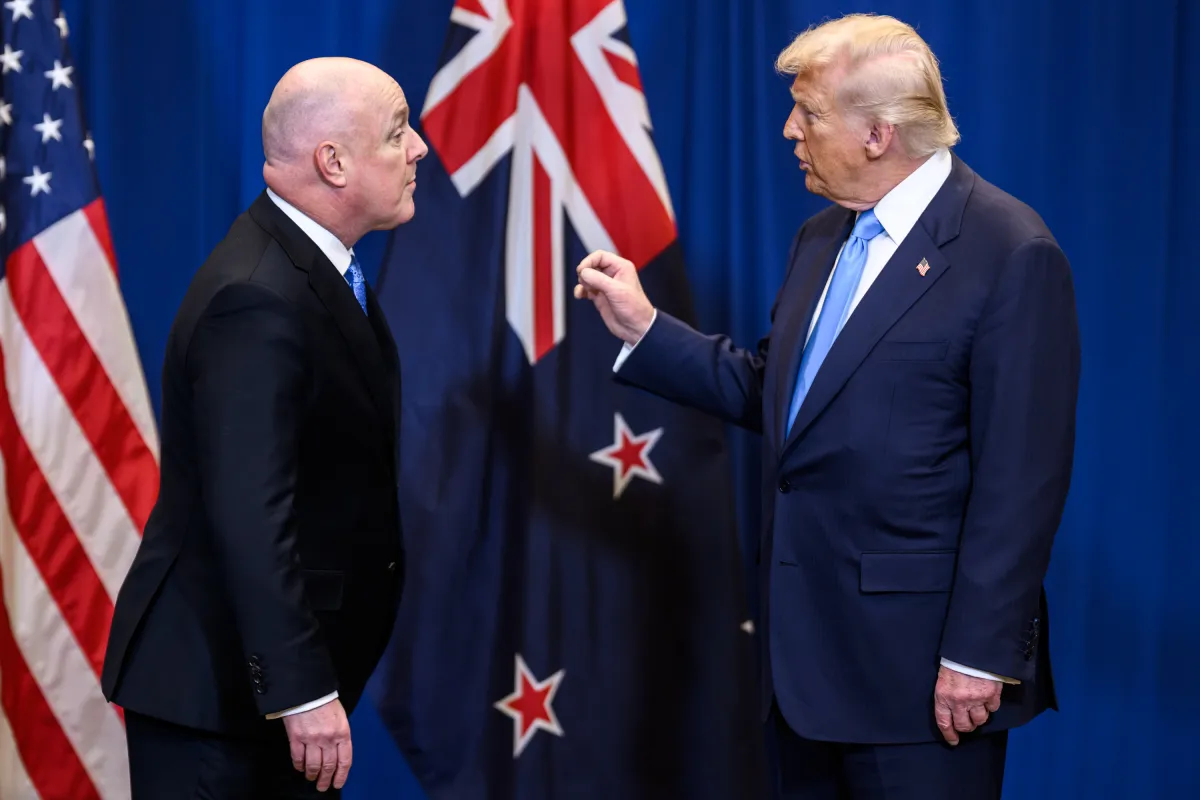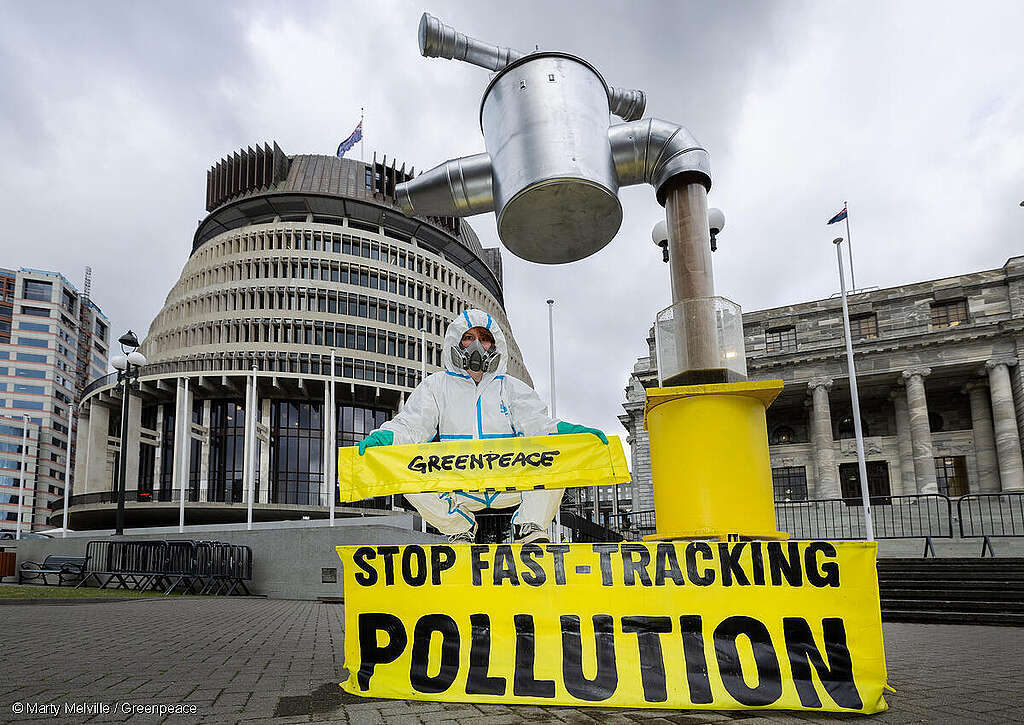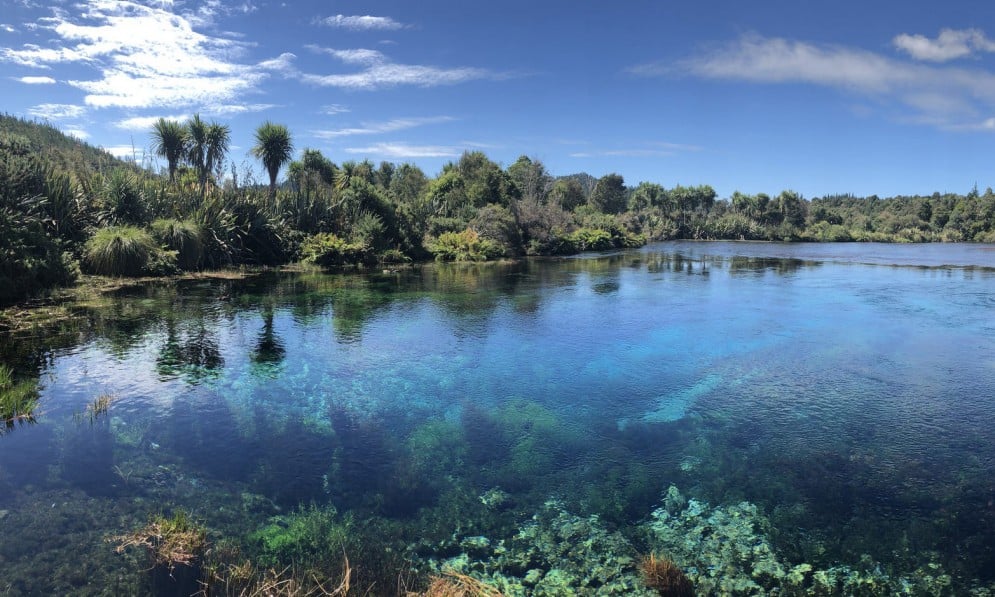Annex 1 – About Greenpeace Aotearoa
Submitter Details
Greenpeace Aotearoa
11 Akiraho Street, Mt Eden, Auckland
Introduction
Greenpeace Aotearoa welcomes the opportunity to submit on the Fast Track Approvals Amendment Bill. Greenpeace strongly opposes this Bill and recommends that it be rejected in its entirety.
The Bill represents a dangerous and undemocratic expansion of the deeply flawed Fast Track Approvals Act. This widely unpopular Act already profoundly erodes our democratic safeguards and allows corporations to run roughshod over the country’s environmental laws to seek approval for their ecologically damaging projects.
This Bill proposes changes to the Act that would grant Ministers the power to influence what should be independent decisions, further exclude hapū, expert and environmental voices, shut down legal appeal avenues, impose absurdly short timeframes on panels, and allow corporations to interfere with the make-up of panels.
Of particular concern is the proposal to grant more power to Ministers to influence the panel’s decision making. Doing this invites a clear risk of actual or perceived conflicts of interest whereby Ministers with ties to corporations, via political donations, are put in a position to influence decisions that benefit those donors. A system that lets corporate political donations tilt decision-making on projects that affect all New Zealanders, is not democratic – it’s dangerous.
The public has been given just seven working days to respond to this Bill which risks causing irreversible harm to Aotearoa’s rivers, forests, oceans, and wildlife. This limited window for public input mirrors the undemocratic nature of the Bill itself and signals that the Government is unwilling to meaningfully engage with experts, environmental groups and the public over the Bill.
Furthermore, the Government’s attempt to frame this Bill as a series of technical adjustments to support the grocery sector is misleading and disingenuous. In reality, the bill proposes major changes to the Act, the true intent of which appears to be clearing a path for approvals of ecologically and socially damaging projects, including those already rejected or stalled in the current fast track process.
In these circumstances Greenpeace makes this submission in line with one of our guiding principles – bearing witness to acts of environmental degradation. Greenpeace’s significant substantive concerns are outlined in more detail in this submission. Briefly, they include:
- Further condensation of timeframes for panels to make their decisions. The arbitrary imposition of just 60 working days for panels to decide on projects regardless of their size, complexity or likely impacts is a dangerous timeframe that will undermine proper environmental assessment.
- Further expansion the power of Ministers to influence decisions through issuing General Policy Statements on the supposed benefits of projects, and giving general direction to the Environmental Protection Authority (EPA).
- Further restrictions of environmental groups, iwi, hapū and civil society from participation in the process.
- The removal of the right to appeal on points of law to the High court for environmental and community groups and hapū.
- The granting of power to corporate applicants to influence the panel that decides on their proposed projects.
These proposals create an even more dangerous and undemocratic fast track process, whereby major projects that have severe environmental impacts can be approved, with minimal scrutiny, expert advice or public input. Greenpeace strongly opposes this Bill in its entirety and recommends it be rejected.
Further rushing high-risk decision-making
- The bill proposes a new timeframe for panels to reach a final decision on an application of a maximum of 60 working days (clause 44). Currently, the Act allows “a time frame that the panel convener considers is appropriate, having regard to the scale, nature, and complexity of the approvals sought in, and any other matters raised by, the substantive application”.
- The bill also proposes cutting the time in which comments on a referral application must be provided from 20 working days to 15 working days (clause 9).
- These timeframes are absurdly short and wholly inadequate for assessing large, complex projects with potentially severe and long-term environmental impacts. High-risk proposals such as seabed mining, mega-dams, and mining require thorough expert scrutiny and public input. This simply cannot be achieved within 60 working days and is likely to lead to approvals being made on projects that have severe impacts on nature and communities, foreseen and unforeseen.
- Greenpeace opposes clauses 44 and 9. Rushing decisions increases the risk of poor-quality decisions, legal challenges, and undermines the credibility of the entire process.
- If this bill is to be passed it must include strong sunset or review clauses. If harmful effects emerge, the Government must be required to review the project and have the power to cancel permits.
Further silencing environmental groups and civil society
- The Act already severely restricts public involvement in the consenting process, by preventing public notification of projects, and providing for public involvement only at the discretion of panels.
- These current restrictions apply even to extremely contentious high risk projects that have already been rejected by the Supreme Court such as Trans Tasman Resources proposed seabed mine in the South Taranaki Bight.
- The Act is already corrosive to our democracy. It prioritises the voices of corporate applicants over experts, communities and everyday New Zealanders. Yet, this Bill proposes even greater restrictions on public involvement.
- The Bill proposes that panels may only seek additional input from hapū, environmental NGOs, and independent experts where local authorities do not intend to address relevant matters (Clause 33(2)). This would drastically reduce the ability of these parties to be heard.
- Additionally, clause 50 would prevent hapū and environmental or community groups from appealing to the High Court on points of law, even if they were invited to comment. In doing so, this bill further restricts access to justice and will likely drive litigation into more costly and complex judicial reviews.
- Greenpeace strongly opposes these provisions. Community and environmental groups are foundational to a healthy democracy. Their exclusion reflects an alarming shift away from robust and fair processes that allow all New Zealanders to shape the country in which we live.
- Communities, hapū, experts and NGOs must have a voice and be able to speak to the impacts of these projects, and must also be able to appeal decisions to the High Court on points of law.
Increasing Ministerial overreach and interference
- Panels already consider regional and national benefits of projects under the Act and can decline a consent if the project’s “adverse impacts are sufficiently significant to be out of proportion to the project’s regional or national benefits”. However, the Bill proposes that the Minister for Infrastructure can issue a Government Policy Statement (GPS) about the ‘regional or national benefits’ of certain types of projects – such as mining (clause 5). Panels would have to consider these GPS.
- Entire classes of projects, such as coal mines or dams on rivers, may be dictated as ‘beneficial’ by Ministers, without consideration or regard to environmental impacts. There are no requirements for public consultation or transparency in how these GPS statements are developed, nor is it expected that the policy statements will outline the costs or harms of the projects.
- Allowing the Minister to dictate the benefits shifts the concept of “benefit” from an objective test to a matter of ministerial preference, which immediately politicises the decision-making process.
- The Bill also proposes granting the Minister power to give a general direction to the EPA in relation to its performance and the exercise of its functions, duties, and powers (clause 48). This undermines the EPA’s independence and further politicises a process that should be expert-led and impartial.
- In effect, the Bill would grant Ministers power to pressure panels to approve their pet projects to please their corporate donors. If Ministers are seen to be shaping outcomes for companies that fund their parties, the legitimacy of the entire process collapses. A system that lets political donations tilt decision‑making is not democratic – it’s dangerous.
- Greenpeace opposes this increased Ministerial interference and calls on the committee to reject clauses 5 and 48. Decision‑making must be insulated from the influence of corporate money. Panels must be free from political pressure to robustly and independently consider the benefits and costs of projects.
Giving corporate applicants greater influence
- The selection of decision-making panels must be fully independent, fair, and free from corporate interference. However, Clause 56(2) would allow corporate applicants to object to panel members they dislike – effectively giving them the power to influence who sits in judgment of their own projects.
- This proposal would erode the credibility and independence of the system and may risk deterring qualified experts from participating. It could lead to panels being tilted in favour of corporate interests leading to approvals for projects that have severe environmental consequences.
- Greenpeace opposes Clause 56(2). Applicants should not have a say over who judges their project. Granting them the power to do so fundamentally compromises what remains of the credibility and impartiality of the decision-making process
Further restrictions on iwi and hapū involvement
- The bill proposes that corporations wanting to use the fast track process no longer have to consult iwi or hapū before applying for fast-track approval – they only have to notify them. These parties then only have just 20 working days to respond (clause 6).
- The bill also proposes that panels may only seek additional input from hapū, where local authorities, such as Councils, do not intend to address relevant matters (Clause 33(2)). It also removes the ability of hapū to appeal decisions on point of law to the HIgh Court.
- This Bill would further exclude tangata whenua from meaningful participation in decisions that affect their rights and resources that are guaranteed to them under Te Tiriti o Waitangi.
- Greenpeace opposes these proposals. An enduring and fair resource management system in Aotearoa must have Te Tiriti o Waitangi at its heart, not run roughshod over it as this Bill does.
Other Concerns
- The Bill proposes that applicants can significantly modify projects once they are already inside the fast-track system (Clause 42), with few constraints. This proposed change creates a situation where applicants are incentivised to game the system by submitting smaller, less impactful projects in order to clear the first hurdles in the fast track process, and then subsequently modify them to much larger and more damaging projects.
- Applicants should not be allowed to materially amend their applications after entering into the fast track process. They must be required to resubmit the application from the beginning.
- The Bill proposes renaming Schedule 2 to “Listed Projects with significant regional or national benefits”. Greenpeace opposes this change. It should be up to panels to determine whether a project has significant regional or national benefits.
- If passed, the Bill should under no circumstances apply retrospectively to projects already in progress. These projects should be subject to the rules in place at the time of application. Retrospective lawmaking is unfair and undermines trust in the legislative process.
- If this bill is passed, projects that have been previously refused under the Fast Track Approvals Act must not be allowed to cut any corners and must undergo a full new environmental, social, and cultural assessment .
- Government statements that these are ‘technical and machinery changes’ to support the grocery sector are inaccurate. As outlined in this submission the proposed amendments significantly alter the Act’s framework, empowering Ministers to push their pet projects, further excluding environmental groups, communities, hapū and experts, and undermining environmental protections.
Conclusion
The Fast Track Amendment Bill represents a dangerous and undemocratic expansion of the deeply flawed Fast Track Approvals Act. Greenpeace Aotearoa opposes this Bill and calls on the Select Committee to reject the Bill in its entirety.
Greenpeace reiterates its position that the Fast Track Approvals Act is an attack on nature and democracy which prioritises corporate interests over the public good, environmental protection, and democratic integrity. It must be repealed.
Annex 1 – About Greenpeace Aotearoa
Greenpeace is a global, independent campaigning organisation that acts to protect and conserve the environment and to promote peace. Greenpeace is one of the world‘s largest and oldest environmental organisations, operating for half a century, since 1971, and now works in more than 55 countries. The New Zealand branch of Greenpeace (Greenpeace Aotearoa) was founded in 1974 and represents many tens of thousands of supporters. Our mission is to ensure Earth’s ability to nurture life in all its diversity.
Greenpeace Aotearoa recognises Te Tiriti o Waitangi signed in Te Reo Māori on 6 February 1840 as the foundation for the relationship between the Crown (and so the New Zealand Government) and the indigenous hapū of Aotearoa. Greenpeace Aotearoa recognises that Te Tiriti o Waitangi affirmed the sovereignty of the tangata whenua, which has never been relinquished despite the violent colonisation of Aotearoa.




